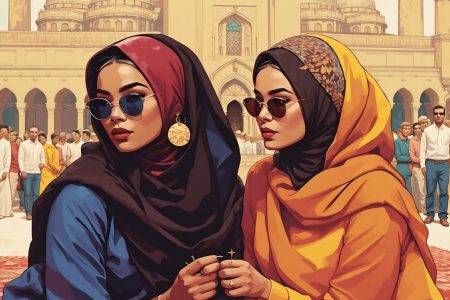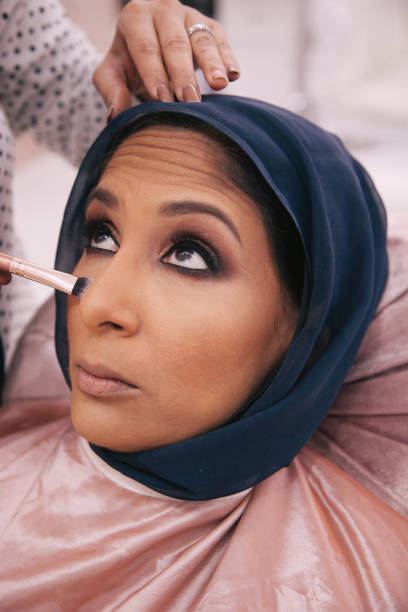…what about women from low-income families, who bear the brunt of disproportionate labor during celebrations? Shouldn’t they, too, be able to enjoy Eid without the weight of unpaid domestic work?


…what about women from low-income families, who bear the brunt of disproportionate labor during celebrations? Shouldn’t they, too, be able to enjoy Eid without the weight of unpaid domestic work?

For what it’s worth, it’s important to discuss the sex scenes in ‘Bridgerton’ and analyse whether or not they are a representation of what good sex should look like. In this writer’s humble opinion, ‘Bridgerton’ sex is terrible and should never be a model or a “how-to” manual for sex. This is especially in relation to female orgasm because as women, we deserve better. Bad sex scenes are unfortunately common in a lot of TV shows and ‘Bridgerton’ is not an exception.

Hidden behind her layers of disappointment was a sense of rebellion which was expressed when she made her complaint to God: ” My Lord! I have given birth to a girl “. The emotions evoked were those of sadness and confusion. She knew that the environment in which she lived did not value the female child, practically forbidding women from having access to the sacred realm. Deep inside her, she wanted to trust in God, that in spite of having a female child, her wish for her child to be dedicated to the service of God could still materialise,

In Muslim circles, it has been appalling to hear people assert that the concept of Mahr – which is a compulsory marital gift that a groom must give to a bride – makes women the object of a transactional marital relationship. In other words, the husband purchases the bride in exchange for sexual and domestic services as well as unconditional obedience to him. If this is not a deliberate distortion of the true spirit behind the Mahr to pander to misogynistic cultures, then I do not know what it is.

The current beauty game is not an individual-based problem. It’s a manifestation of a broader toxic dynamic. For someone as powerful as an influencer to state that concealing a perfectly normal feature of her face and/or body is empowering isn’t just a statement of personal empowerment, especially when their brand is catered to a specific audience which includes young women in their teens and early twenties. It no longer feels valid to hide under the umbrella of “personal choice” or claim ignorance when your contribution to toxic beauty standards hurt young Muslim women who cannot live up to these ideals.

Women who don’t become pregnant have been presumed to have weak morality and stereotyped as promiscuous or masculine. From the snide comments about her chastity and medical history to the explicit confrontations about whether or not she has had an abortion in the past or has been using contraceptives to avoid getting pregnant, the issue of infertility is a leading cause of anxiety and mental health issues for many women.

Almost two years ago, I wrote a long twitter thread explaining what a Muslim marriage contract entails and why I think every young person looking to get married should get one. The reactions from many young Muslim men were quite appalling. Many of them interpreted this gesture as an attack on the male gender, some said it was a sign that couples don’t trust each other and many others said it was a means to sneak liberal ideologies into Islam.

In our modern world, this incident would have an entire community swearing and condemning a woman for daring to leave her marital home in a state of anger, let alone staying at her aunt’s for a period of four months. Muslim women today, are told that to step foot outside their matrimonial home without their spouse’s permission is tantamount to stepping into the fire of hell. There is a lot of oppression and spiritual blackmail going on in our communities against women and if these issues are not addressed, they’re going to have a devastating effect on our ummah.

“In Her Words” is a big conversation starter. African women have come a long way but there is so much further to go. Books like this are vital for Africans, non-Africans and those seeking to understand feminism in Africa. It will also add to an already rigorous body of writing about this topic. While these essays promote a courageous and bird’s eye view of African women on the African continent, most of the writers agree that collective acceptance and solidarity is best achieved by promoting diversity even while fighting for the same cause.
From, Al-Tabari’s account, Al-Zabbāʾs all-consuming quest for revenge renders her a tragic character, which is evident towards the end of the play when ʿAmr captured Tadmur and walked into Al-Zabbāʾs room. However, in Maḥmūd Diyāb’s very recent account of this history, although al-Zabbāʾ is perfectly resigned to her fate and is ready to poison herself, ʿAmr refuses to kill her for one reason.